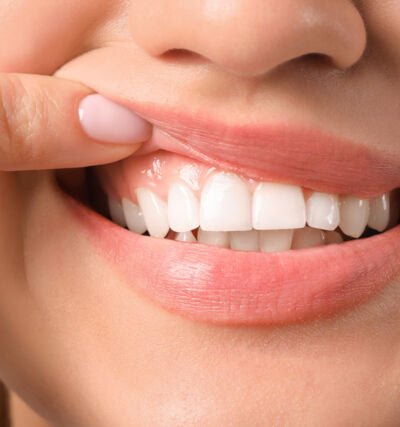Gums Are Receding: Causes, Symptoms, and Solutions

Gums Are Receding: Causes, Symptoms, and Solutions - Enzim Singapore
Many individuals may experience a dental condition that is often overlooked until it reaches a concerning level: gums are receding. This gradual process can lead to various oral health issues, including increased tooth sensitivity, decay, and even tooth loss if not addressed. In this comprehensive article, we will explore the causes, symptoms, and effective solutions for when gums are receding, helping you understand how to maintain optimal gum health.
What Does It Mean When Gums Are Receding?
When we say that gums are receding, we are referring to the situation where the gum tissue that surrounds the teeth wears away or pulls back, exposing more of the tooth or its root. This can make the teeth appear longer and can lead to discomfort and increased sensitivity. If left untreated, receding gums can progress to more severe gum disease, which can complicate oral health even further.
The Importance of Healthy Gums
Maintaining healthy gums is crucial for overall oral health. Gums serve as a protective barrier for the teeth and their roots, preventing bacteria from entering the bloodstream and potentially causing systemic health issues. When gums are receding, this protective layer is compromised, leading not only to local dental problems but also to potential links to systemic conditions such as heart disease and diabetes. Therefore, understanding and addressing receding gums is vital for both dental and overall health.
Causes of Receding Gums
Understanding the causes of receding gums is essential for both prevention and treatment. Some common factors include:
Poor Oral Hygiene: Inadequate brushing and flossing can lead to plaque buildup, which hardens into tartar, irritating the gums. Neglecting daily oral care can result in gingivitis, the early stage of gum disease.
Gum Disease: Conditions such as gingivitis and periodontitis can lead to inflammation and infection of the gum tissue, causing gums to recede. Periodontitis can result in the loss of bone that supports the teeth, further exacerbating the problem.
Genetics: Some individuals may be genetically predisposed to gum disease and receding gums. A family history of dental issues can play a significant role in one's susceptibility to these conditions.
Hormonal Changes: Fluctuations in hormones, particularly in women during puberty, pregnancy, or menopause, can make gums more sensitive and susceptible to recession. These changes can affect blood flow to the gums and alter their response to bacteria.
Aggressive Brushing: Brushing too hard or using a hard-bristled toothbrush can wear down gum tissue over time. While good oral hygiene is important, it is equally important to use gentle techniques to avoid damaging delicate gum tissue.
Tobacco Use: Smoking or using other tobacco products can contribute to gum disease and recession. Tobacco diminishes blood flow to the gums, making them more vulnerable to infection and reducing their ability to heal.
Misaligned Teeth: Crooked teeth or an uneven bite can exert extra pressure on the gums, leading to recession. Orthodontic issues can create areas where plaque and bacteria can accumulate, further contributing to gum disease.
Chronic Teeth Grinding: Also known as bruxism, this condition can place excessive force on the gums, leading to recession over time. Stress and anxiety are common triggers for teeth grinding.
Symptoms of Receding Gums
Recognising the signs of receding gums early can help prevent further damage. Common symptoms include:
- Longer-Looking Teeth: When gums are receding, teeth may appear longer than usual, which can be an early indicator of gum recession.
- Sensitivity: Increased sensitivity to hot, cold, or sweet foods and beverages is common. Exposed tooth roots can lead to discomfort and pain.
- Exposed Tooth Roots: The roots of the teeth may become visible as the gums recede, leading to discomfort and a higher risk of decay.
- Gum Inflammation: Red, swollen, or tender gums may indicate inflammation due to gum disease. If you notice these symptoms, it is essential to take action.
- Bleeding Gums: Gums that bleed during brushing or flossing may signal a problem. This is often one of the first signs of gum disease.
- Pus Between Teeth: This could indicate a gum infection, which is a serious condition requiring immediate dental care.
Solutions for When Gums Are Receding
If you notice symptoms of receding gums, it is crucial to take action to protect your oral health. Improving your oral hygiene is essential; this includes brushing your teeth twice a day with fluoride toothpaste and a soft-bristled toothbrush, as well as flossing daily to remove plaque and food particles between your teeth. You may also want to consider using an antibacterial mouthwash to further reduce plaque and bacteria.
Regular dental check-ups are equally important, as visiting your dentist for cleanings and examinations can catch early signs of gum disease, allowing professionals to provide deep cleanings and tailored treatments. When brushing, use a soft-bristled toothbrush and gentle techniques to avoid damaging the gums, opting for circular motions instead of vigorous scrubbing. If you smoke or use tobacco products, quitting can significantly improve your gum health, and seeking support from healthcare professionals or cessation programs may aid in the process. Additionally, if hormonal changes or other health issues contribute to gum recession, it is wise to consult your healthcare provider for appropriate management, especially since conditions like diabetes can exacerbate gum issues.
In some cases, professional treatments such as scaling and root planing, gum grafts, or laser therapy may be necessary to restore gum health and rebuild lost tissue. If you experience tooth sensitivity, consider using toothpaste designed specifically for sensitive teeth, which contains ingredients that help block pain sensations. Lastly, if misaligned teeth contribute to your gum recession, orthodontic treatment such as braces or aligners may be needed to correct dental alignment and distribute pressure evenly across the gums. By taking these steps, you can effectively address the issue of receding gums and maintain better oral health.
Beyond Treatment: Lifestyle Changes for Healthy Gums
In addition to specific treatments, adopting lifestyle changes can significantly impact gum health:
- Balanced Diet: A diet rich in vitamins and minerals, particularly vitamin C, can support gum health. Foods like fruits, vegetables, and whole grains are beneficial for overall oral health.
- Stay Hydrated: Drinking plenty of water can help wash away food particles and bacteria, keeping your mouth moist and less prone to decay.
- Manage Stress: Since stress can contribute to teeth grinding, practicing stress-reducing techniques such as yoga, meditation, or deep-breathing exercises can help protect your gums.
- Limit Sugary Foods and Drinks: Reducing sugar intake can decrease plaque buildup, lowering the risk of gum disease.
Conclusion
understanding the causes and symptoms of this condition, individuals can take proactive steps to maintain their gum health. Regular dental check-ups, improved oral hygiene practices, and lifestyle changes can go a long way in preventing and treating receding gums. Additionally, using Enzim Fresh Mint Toothpaste can help support gum health when gums are receding, as its gentle formula works to clean and soothe sensitive areas without causing further irritation. If you suspect you have receding gums, don’t hesitate to consult your dentist for personalised advice and treatment options.
With the right care and attention, you can protect your smile and enjoy optimal oral health, ensuring that your gums remain healthy and your teeth stay strong for years to come. Remember, your oral health is an integral part of your overall well-being, and taking steps to maintain it will lead to a healthier, happier you.



